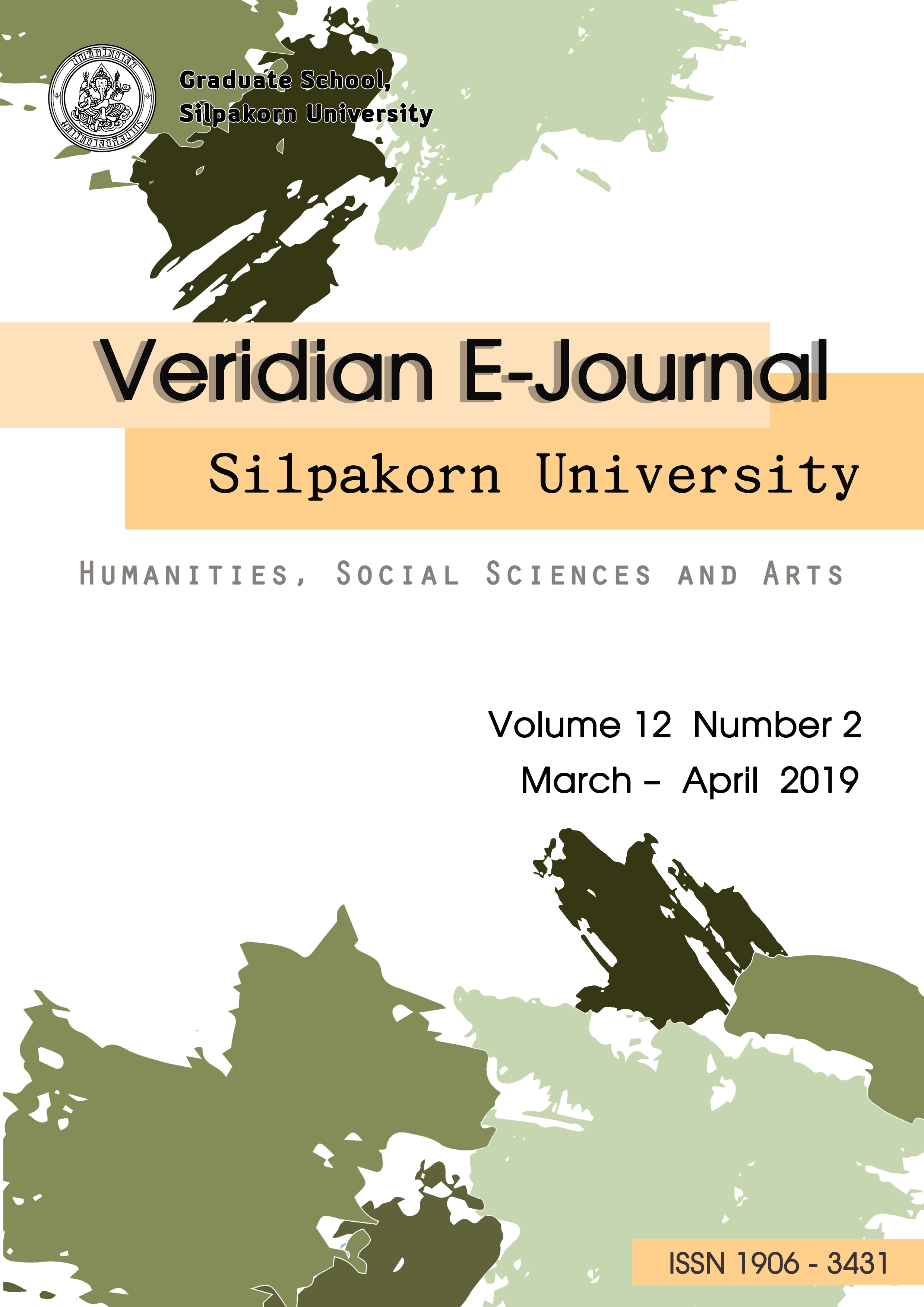วัฒนธรรมองค์การที่ส่งผลต่อประสิทธิผลขององค์การ: บริบทการให้บริการของ สายการบินเซาท์เวสต์ (Organizational culture affecting organizational effectiveness: The context of Southwest Airlines service provision)
Main Article Content
บทคัดย่อ
วัฒนธรรมองค์การกลายเป็นประเด็นสำคัญของการดำเนินธุรกิจในยุคนวสมัย โดยถือเป็นปัจจัยที่มีความหมายส่วนสภาพแวดล้อมภายในที่องค์การสามารถบริหารจัดการและควบคุมได้ เพื่อส่งเสริมการดำเนินการให้เป็นไปตามเป้าหมายขององค์การ บทความนี้มุ่งศึกษาแนวคิดเกี่ยวกับวัฒนธรรมองค์การ ความสำคัญของวัฒนธรรมองค์การต่อประสิทธิผลขององค์การ บทบาทของวัฒนธรรมองค์การต่อการให้บริการของสายการบิน โดยการทบทวนวรรณกรรมงานวิจัยต่างประเทศเพื่อนำแนวคิด ทฤษฎีและผลการวิจัยมาสนับสนุนให้เห็นถึงความสำคัญของวัฒนธรรมองค์การ ประกอบกับการเชื่อมโยงถึงการเป็นตัวอย่างที่ดีของวัฒนธรรมสายการบินเซาท์เวสต์ที่ประสบความสำเร็จ ทำให้เกิดการสร้างความเข้าใจอย่างลึกซึ้งและรอบด้านเกี่ยวกับการบริหารจัดการองค์การในบริบทสายการบินที่เหมาะสมเพื่อให้เกิดความได้เปรียบในการแข่งขัน การประสบความสำเร็จและความมีประสิทธิผลขององค์การ
Organizational culture has become an important topic in business operation through the postmodern era. It plays a meaningful role as internal environment in which organizational culture can be managed and controlled in fostering objective of organizational operation. This article purposes to study the concept of organizational culture, the importance of organizational culture affecting organizational effectiveness and the role of organizational culture in airline service provision. This paper reviews international research literature in order to highlight the importance of using concept, theories and previous studies to present significance of organizational culture. Accompanied with Southwest airline’s best practice that build an in-depth and comprehensive understanding of the organizational management in airline business context in order to gain valuable competitive advantage, business success and organizational effectiveness.
Article Details
เอกสารอ้างอิง
Certo, C.S. (2003). Modern management. (9th ed.) New Jersey: Prentice Hall.
Grandey, A.A. (2000). Emotional regulation in the workplace: A new way to conceptualize emotional labor. Journal of Occupational Health Psychology, 5(1), 95-110.
Greenberg, J. & Baron, R. A. (2003). Behavior in organization understanding and managing the human side of work. (8th ed.) Upper Saddle River, New Jersey: Prentice Hall.
Hartline, M.D., Maxham , J.G. & McKee, D.O. (2000). Corridors of influence in the dissemination Of customer-oriented strategy to customer contact service employees. Journal of Marketing, 64, 35–50.
Hartnell, C.A., Ou, A.Y. & Kinicki, A.J. (2011). Organization culture and organizational effectiveness: A meta-analytic investigation on the competing value framework’s theoretical suppositions. Journal of applied psychology, 677-694.
Hofstetter, H. & Harpaz, I. (2015). Declared versus actual organizational culture as indicated by an organization's performance appraisal. The international journal of human resource management, 26(4), 445–466.
Hogan, S.J., & Coote, L.V. (2014). Organization culture innovation and performance: a test of Schein’s model. Journal of business research, 67, 1609-1621.
Kim, Y.K. & Lee, H.R. (2009). Airline employee’s service behavior toward between different nationalities. International Journal of Hospitality Management, 28(3), 454–465.
Klein, G.D. (2012). Creating cultures that lead to success: Lincoln Electric, Southwest Airlines and SAS Institute. Organizational dynamics, 41, 32-43.
Macedo, I.M., Pinho, J.C. & Silva, A.M. (2016). Revisiting the link between mission statements and organizational performance in the non-profit sector: the mediating effect
of organizational commitment. European management journal, 34(1), 36–46.
Miles, S.J. & Mangold, W.G. (2005). Positioning Southwest Airlines through employee branding. Business Horizons, 48, 535-545.
Murrow, R. (2004). Herbert D. Kelleher, Southwest Airlines, 2003, Bower award for business leadership laureate. Journal of the Franklin institute, 341, 207-209.
Palladino, J.M. (2004). Review of the Southwest Airlines way: Using the power of relationships to achieve high performance by J.H. Gittell. Journal of Women in Educational
Leadership, 2(1), 68-74.
Schein, E.H. (1992). Organizational culture and leadership. 2nd ed. California: Jossey-Bass.
Skytrax. (2018). The World’s Top 100 Airlines 2017. Retrieved on October 30, 2018 from https://www.worldairlineawards.com/the-worlds-top-100-airlines-2017/
Southwest airlines. (2018a). Our mission. Retrieved on October 26, 2018 from https://careers.southwestair.com/culture
Southwest airlines. (2018b). To our employees. Retrieved on October 26, 2018 from https://careers.southwestair.com/culture
Southwest airlines. (2018c). Annual report 2017. Retrieved on October 30, 2018 from https://investors.southwest.com/financials/company-reports/annual-reports
Statista. (2018). American customer satisfaction index scores for Southwest Airlines in the United States from 1995-2018. Retrieved on October 30, 2018 from https://www.
statista.com/statistics/422062/american-customer-satisfaction-index-for-southwest-
airlines-us/
Stein, N. (2000). Winning the war to keep top talent. Fortune magazine, 141(11), 132-136.
Tahmincioglu, E. (2004). Keeping sprits aloft at JetBlue. Workforce management. Retrieved on October 30, 2018 from https://www.workforce.com/2004/12/06/keeping-spirits-aloft-at-jetblue/
Tesluk, P.E., Hofmann, D. & Quigley, N. (2002). Integrating the linkages between organizational culture and individual outcomes at work. Psychological Management of Individual Performance. New York: John Wiley & Sons.
Tsang, K.F. (2011). Dimensions of Chinese culture values in relation to service provision in hospitality and tourism industry. International journal of hospitality management,
30, 670-679.
Zeithaml, V. & Bitner, M.J. (2000). Services marketing: Integrating customer-focus across the firm (2nd ed.) New York: McGraw-Hill.

